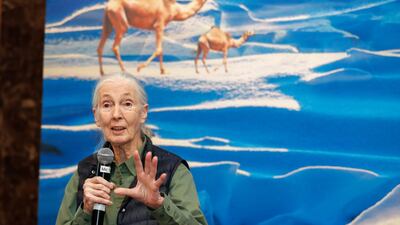In 1960, David Greybeard the chimpanzee was sat on a termite mound using a shoot of grass as a spoon. He stopped, picked up a leafy twig, peeled it and dipped it in the nest to make the most of the high-protein meal.
This chimpanzee’s simple act was witnessed by Jane Goodall, a 26-year old woman with no formal scientific background who had gone to live in with the chimpanzees in the jungle of Tanzania.
Her observations of moments like this transformed our understanding of the animal kingdom, demonstrating that animals had personalities, complex relationships and were capable of both great altruism and cruelty.
The story is a familiar one to fans of Dr Goodall and today, a group of pupils in Abu Dhabi heard for the first time from none other than the Dame herself.
“Now if you saw that today in the wild it wouldn’t be exciting at all but it was exciting then because it in the sixties thought only human beings made tools,” she told pupils on Thursday.
Dr Goodall was in the country to present awards to UAE chapters of Roots and Shoots, a youth conservation programme that she founded in 1991. It invites children to find ways to help people, animals and the environment in their community.
As children explained their projects to Dr Goodall, their words mirrored the values she raised in her talk, including the need for individuals to cut consumption and the global impact of small habits.
“We are so set in this lifestyle where we have what we want and take whatever we need,” said Sara Azeem, 16, a year 11 pupil at St Joseph’s School. “Limiting what you need can make such a big difference.”
Sara is a member of her school’s environment club, Verte, which has banned plastic bottles, created a school compost and, due to the Roots and Shoots programme, is encouraging school pupils to go vegetarian once a week to reduce their carbon footprint.
________________
Read more:
From the North Pole to an organic journey
Shark lessons in Abu Dhabi and Fujairah to spread the word on species at risk
Responsibility for climate change lies with us all
________________
“It’s the world we’re living in, we are going to be in this world in the future so doing these small, small things do make such a big difference,” said Sherin John, 16, another year 11 pupil at St Joseph’s School. “We’ve been thinking about it and we’ve decided that our lives should be a blessing to the earth because what we do should not leave an impact on others.”
Roots and Shoots connects UAE members with chapters in more than 130 countries. There are now 80 participant schools in the country and businesses can join too.
“It really is a one of a kind programme,” said Mariam Al Qassimi, a communications specialist with Environment Agency - Abu Dhabi. “It’s so grassroots in the sense that it looks at local issues to the extent that it asks the child or the young person who knows what’s going on in the community to really take action. So it’s not an organisation that imposes what should be done in different countries but rather asks people to find their own solutions.”
Thursday's event marked the launch of the 2041 Climate Force Challenge, where participants commit to five actions that reduce their carbon footprint. It is led by Sir Robert Swan, the first man to reach both South and North Pole.
Dr Goodall reminded students and teachers to nurture curiosity. She recalled how at age four she hid in the henhouse to discover how its inhabitants lay eggs. She emerged nearly four hours later, hair covered in straw, oblivious to the fact that she had been reported missing to the police. But there was no rebuke from her mother.
“Instead of being angry she saw my shining eyes and sat down to hear the wonderful story of how a hen legs an egg,” she said. “A different kind of mother might have crushed that early curiosity.”
Small actions add up, said Dr Goodall.
“The most important thing is that everybody has to really believe that every day they’re living they make some sort of impact on the environment and they get to choose what sort of impact they have,” she said. “The reason that people chose not to change their behaviour, even though they know what’s going on, is because they really feel what they do as an individual doesn’t make a difference.
“Children much more quickly understand the cumulative effect of small choices. They get it and that’s good.”

